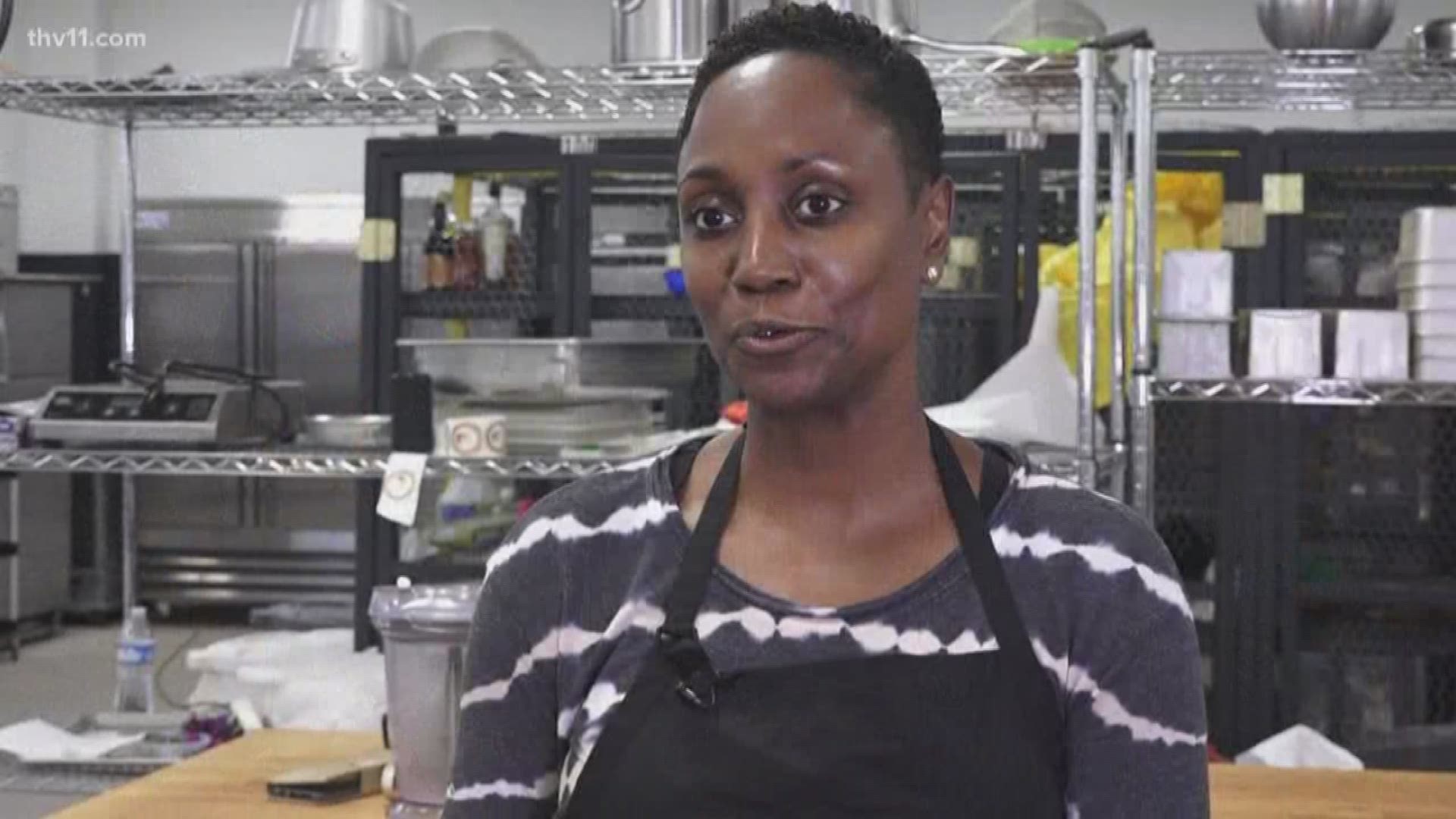LITTLE ROCK, Ark. (KTHV) - They were cool, new and delicious. Food trucks started to rise up all across Little Rock around 6 years ago.
But, over the last few years, there have been dramatic changes to the food truck industry in central Arkansas and some local experts say the scene is starting to fizzle.
In this two-part series, Amanda Jaeger looks into why so many food truck owners have closed their doors for good and what new food truck alternatives are springing up across the city.
Why did some of the most popular food trucks in the city close their doors?
If you've lived around town for a while, you probably remember the super popular food trucks that ignited the food truck scene in the city. Some of the top trucks were Southern Gourmasian, Fork in the Road, Waffle Wagon and the Beast.
Yet nearly all of the popular food trucks that were booming in 2012-2014 are no longer operating. The owners closed up shop and left the daily grind of the food truck business behind. Megan Kessler was a co-owner of the Fork in the Road food truck 5 years ago at the height of the food truck rise. She quit her full-time job to run the food truck.
“The first year was great and I made more money than I could have ever imagined,” Kessler said.
While the instant success was exciting, it wasn’t lasting. By year two, Kessler chose to get out of the business before it ate every last penny of her pocketbook.
“You see these shows on television and you think you can just park your truck wherever you want and open your window you’re going to make five thousand dollars,” she said. “In reality, you just can’t.”
She said as more and more food truck events and locations started up, organizers got greedy. She said they saw food trucks as the main way to get revenue.
“Everyone wanted a fee and everyone wanted a different license,” she said. “Every time you turned around it was $250 dollars here and it was another $10 dollars there.”
On top of the fees, there was an overflow of events for food trucks.
Kessler said that was partly because more chefs and entrepreneurs started to see the food truck business as a lucrative option. Yet as more trucks were coming on the scene, all the new events were not producing large crowds.
“If you are serving 300 people, you don't need six trucks and a lot of places got in the habit of booking trucks where they were oversaturating the market,” she said. “My food truck alone needed 200 to 300 customers just to break even or survive.”
After attending an event that had such low attendance that the food trucks participating were having to throw away food, she knew it was time to make a change.
That's when she closed the doors, went to work for Rebel Kettle and said goodbye to her dream.
“The decline was so fast and so hard and it went from where everyone was very lucrative to not making a dime,” she said.
Just a few years ago, the Southern Gourmasian was also one of the most popular food trucks in the city. Now, that food truck sits in a parking lot and will likely never be used again. Former owner, Justin Patterson, said the decline happened after 2014.
“2013 and 2014 were our bang-up years,” Patterson said. “Those were the years where we kind of pioneered the food truck explosion and everyone was getting behind the trucks and all the events were big.”
After 2014, the sales started to plummet for Southern Gourmasian and many of the popular food trucks of that time.
“In the earlier years, we had regular weekday lunches where we served more people than we did last year at events that were supposed to be monthly food truck events,” he said.
He said there weren’t a lot of great places to set up the food truck for daily lunches and that the places that did allow it were charging too high of fees. He decided to use the food truck for catering and opened a brick and mortar store instead. That came with a different set of challenges and Southern Gourmasian’s truck and brick and mortar eventually closed for good.
“Running a restaurant is easier than running the food truck,” he said. “But obviously it’s more risk, it costs a lot more money, and you have to serve a lot more people to hit your numbers.”
For Patterson, he said it was a risk he had to take because no changes were coming.
“Event organizers weren't interested in what the food truck owners opinions were on the events and didn't want to have a collaborative vision on how to grow the food trucks,” he said.
Patterson said he believes there still aren’t enough good places to park food trucks in Little Rock and that there isn’t enough being done by the community and city for the food truck culture to be successful. Both Patterson and Kessler said they wouldn’t open a food truck again.
Greg Henderson, owner of Arkansas’ top food blog, “Rock City Eats” (https://www.facebook.com/RockCityEats/), has organized or helped organize nearly 30 food truck events over the years. He said it was a constant challenge to keep events afloat.
“A lot of these festivals have gotten to where they charge too much money and so they are really cutting into the quality food trucks’ margins and that really hurts,” he said. “It has made it to where customers are not as excited about food trucks anymore because some of what’s remaining isn't as quality food.”
Henderson said it is much easier for a food truck that serves cheaper products to survive because the cost of operating and attending festivals is often too high for people that use more quality products.
He said some trucks are able to make it work, but he doesn’t believe it will be sustainable for all of them. Henderson said that if this trend continues, the food truck industry will likely continue to suffer and people will turn to other options.
“For a long time, food trucks were operating as that startup hub of local restaurants and now that's shifting to catering options and commercial kitchens,” he said.
New alternatives to traditional food trucks
As the food truck scene in Little Rock faces growing challenges, some people are turning to alternatives to give their businesses a fighting chance. One alternative for food trucks is commercial kitchen space like Arkitchen in Little Rock (http://arkitchenlr.com/). It is a massive shared commercial cooking space with all the cooking bells and whistles. It’s the perfect place for Matcha Noorwood, owner of Cinnalightful (https://www.facebook.com/cinnalightful/).
Cinnalightful is a wholesale baking company that makes many of the treats you'll find on local restaurant menus. Noorwood said she decided to join the commercial kitchen because it allowed her to produce exponentially more products than she could produce at home.
“I only had one small oven at home which allowed me to make maybe nice cheesecakes at a time,” she said. “Here, I have so many ovens to use and we can bake 100 cheesecakes a week or even in a day if we needed to.”
She said working out of Arkitchen gives her way more bang for her buck than she could get with a food truck.
“The wholesale route is better because I don't have to worry about finding customers to sell to,” she said. “I sell my products to the retailer and they get it to their customers.”
She said she would consider opening a food truck someday in addition to her wholesale company but said, for now, she believes food trucks are just too risky.
Arkitchen owner, Jon Lamb, said more and more people are turning away from food trucks to commercial kitchens like his. They don’t require a major investment and customers can rent by the hour or the month. Lamb said the option is more attractive because there is less risk.
“You can come in here and for a couple hundred dollars start your product line and see if it works in the community,” he said. “If not, it’s no big deal because you haven't spent 20 to 80 thousand dollars on a food truck.”
In addition to Arkitchens changing the traditional food truck scene, mobile-based catering businesses are also making their mark. Amanda Ivy owns Low Ivy Catering (https://www.facebook.com/ChefAmandaIvy/), which operates as a mobile catering business.
Ivy is an expert in the food truck business, having worked on traditional food trucks and even appearing as a contestant on the Food Network’s “Great Food Truck Race.” She said mobile catering trucks are becoming a more viable business option than traditional food trucks serving daily lunches.
“Nowadays you are seeing less pop-up trucks as a lunch service and more as this catering dynamic,” she said. “It’s smart.”
She said the option gives more flexibility and allows for a company to focus its time on catering. She said more food trucks are moving their focus to catering. Because it’s an option that’s often more profitable than the day-to-day lunch food truck grind.
“For anyone who does not have investors knocking at their door, I feel that this is a really good route to take,” she said.
Another alternative food truck option comes from brick and mortar restaurants. More and more restaurants are adding a food truck in addition to their brick and mortar and using it as a way to help market their business and draw in new customers. It’s what the Arkansas Heart Hospital is doing with their popular in-hospital restaurant, Coby’s (https://www.facebook.com/ArHeartHospital/). They recently launched a new mobile marketing food truck.
“This is only for community outreach and for marketing,” said Coby’s head chef, Coby Smith. “We want the hospital and restaurant to grow and this is a great way to make that happen.”
He said the hospital views the truck as less of a profit-maker and more of a tool.
“We’re going to take this truck to small towns and clinics in the state that have never had a food truck we'll be able to get better exposure and more exposure.”
Greg Henderson, owner of Arkansas’ top food blog, “Rock City Eats” (https://www.facebook.com/RockCityEats/), said new ideas and creativity like this could be the answer to solving the food truck fizzle.
‘There’s absolutely room to grow and there’s room for us to come up with more innovative options as to how we handle food trucks,” he said.
He also hopes an investor will come along to create a modern space for food trucks to set up shop on a daily basis. He said having more permanent and reliable spots could help food trucks of all backgrounds.
“We need an investor who is willing to put in a really good food truck court or a place that’s really centered on making food trucks profitable,” he said. “It needs to have marketing dollars behind it so more people come out and eat at the food trucks.”


